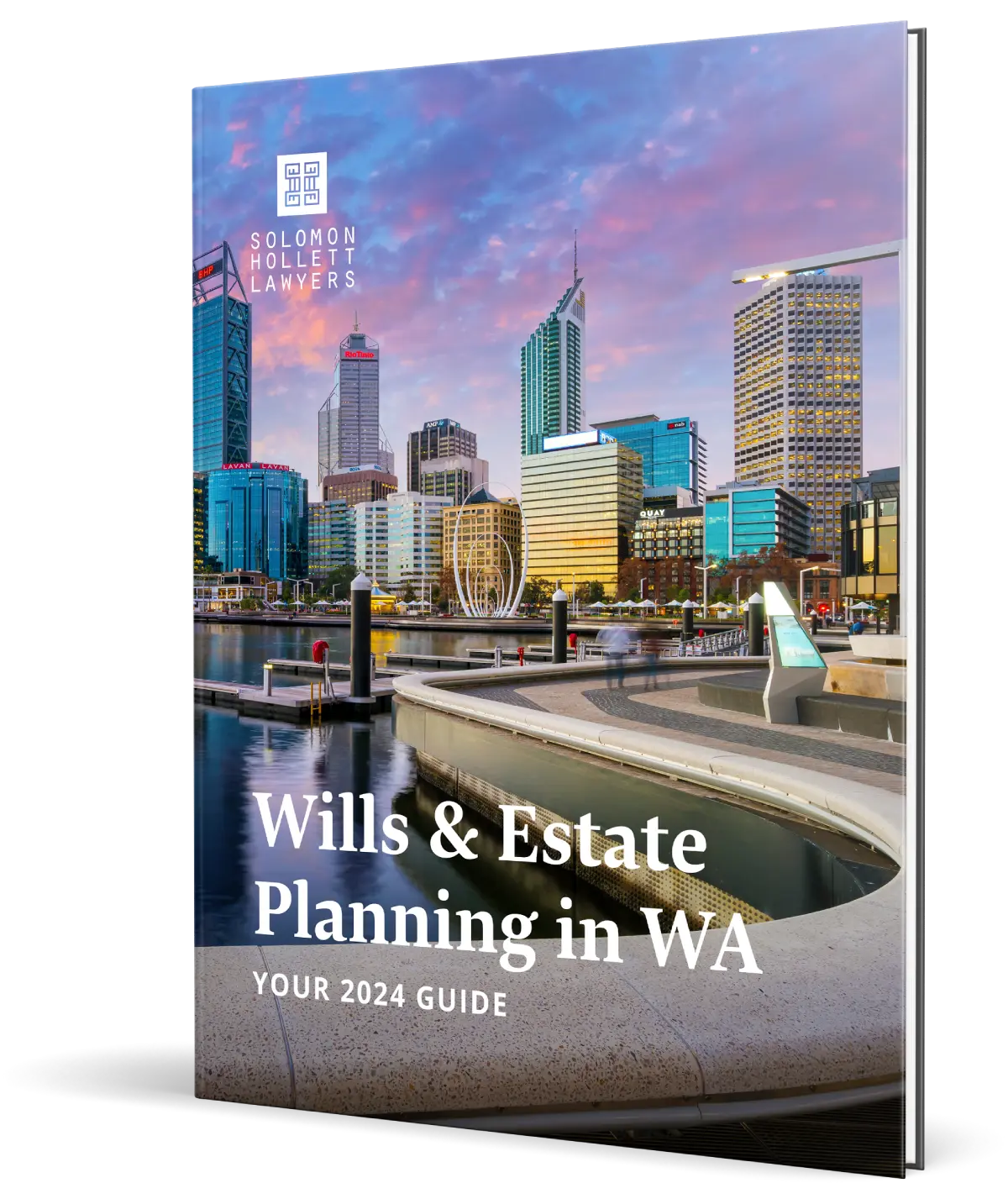Estate planning lawyers
Estate planning is all about ensuring your loved ones are protected and looked after when you are no longer around, and that your assets that you’ve spent your life working so hard to build up are distributed to the right people for the right reasons at the right time and with the best benefit and the best outcome.
Having the right estate plan in place gives such peace of mind, can avoid costly and irreparable family disputes, can deliver clever tax savings, puts in place the right executors and trustees, and properly documents gifts and legacies.



The key components of an estate plan
The bedrock of any estate plan is a good Will but there are usually many other elements, the most common include:
- Testamentary Trusts
- Discretionary and Protective Trusts
- Enduring Powers of Attorney
- Enduring Powers of Guardianship
- Advance Health Directives
A complex area of law, one you need to get right
Estate planning sits within a complex legal and societal landscape these days. This is because Australian family structures are more complex than ever before, and the assets we hold are more complex with superannuation, sophisticated business structures and interests, family trusts and investments all needing different considerations. And we’re not just the ‘lucky country’ anymore, we’re also wealthier than ever – a recent report suggesting the stakes have never been higher with $3.5 Trillion in assets to pass from one generation to the next in the next 15 years in Australia.
Properly drafted and considered estate planning can prevent disputes and give you incredible peace
of mind knowing that tomorrow is well taken care of.
On the other side of the coin, the perils of no estate planning, or a poorly drafted or an inadequately considered Will are fertile ground for protracted and expensive litigation, family heartache and a disastrous legacy no one would want to leave behind. Strong legal advice and guided, open conversations with your family and those around you are key.
We are highly experienced and highly regarded when it comes to Wills and estates, succession and inheritance law, regularly featuring on the top of the prestigious peer-voted Doyle’s Guide annual rankings. Our legal advice and strategies help our clients create, preserve, transfer and, govern their wealth, to ensure their loved ones are properly provided for and well protected – we strive to ensure our clients leave the right legacy in place.
Our client testimonials
From individuals to families, from startups to large corporates, professional groups to charitable foundations - we've stood beside a diverse range of clients helping them best navigate their legal journeys. Here’s what just some of them have to say.

Morgan Solomon

Brandon Hetherington

Morgan Solomon

Andrew Bower

Craig Hollett
Discover the Solomon
Hollett difference
Personalised legal solutions
Comprehensive legal knowledge
Client-centric approach
Proven track record
Accessible and timely legal services
Transparent and up front
The importance of estate planning
Frequently
asked
questions
Can’t find what you are looking for?
Can I use my Will to nominate who will take care of my kids after I’m gone?
In WA you can use your Will to appoint a trusted family member or friend to be the guardian of your minor children, but there are limitations. The appointment of a guardian under your Will usually only takes effect where you are the last surviving parent or guardian of the child, and it only lasts until the child reaches 18 years of age – or even younger depending on the maturity of the child.
Where the other parent of your children survives however, in most cases they will naturally assume the role of guardian of your children, even if you were not in a relationship with that other parent at the time of your death, and the children primarily lived with you. This is the case even if you appoint someone else as the guardian of your children in your Will.
What you must remember is that the Family Court has the last word on parenting, and where there is a dispute about the appointment of a guardian, or where there is no guardian appointed, any person with a ‘sufficient interest’ may apply to the Court for a parenting order. Your Will is nonetheless a powerful means of recording your wishes and it is always a good idea to take advantage of the opportunity to make those wishes known. Choosing the right legal guardian for infant children is a decision that if wrong can outweigh everything else. Sadly, we have a few instances where small children are involved where people jostle for control of the trust be appointed as legal guardians for all the wrong (financial) reasons.
When deciding who you would like to appoint as guardian of your minor children, it is important to keep practical things in mind, such as the potential guardian’s relationship to the child, their own personal circumstances (such as where they live, their own family structure and financial position), and the potential guardian’s relationship with the executor of your Will. For example, if the person you would like to nominate as guardian of your children lives overseas, this may mean that either your children or their guardian must relocate which may not be practical or possible. All of these things will need deep consideration before settling on the best candidate for guardianship.
I’m a single parent and the other parent has no contact, can I nominate a guardian outside the family?
There is no restriction on you who you can nominate as legal guardian for your minor children. But remember this: children are not property, unlike your assets, such as real estate or cash. You cannot dictate who is going to be the guardian, you can nominate people who you endorse, but ultimate it is up to the Family Court to determine if your nomination is valid.
Even if one parent has no contact, then after you die that parent can still make application to the Family Court to have custody, and they are likely to get it, unless there are extreme circumstances. The Family Court always acts in the best interests of the child, so you could set up in your Will a fighting fund to make sure the best case is put to the Family Court around your choice of guardian.
In this case, you may want to ensure that the assets you leave to your children are properly protected and that you have a good Will with a good trust in place, and if you nominate the right trustees of the kids trust then they can ensure that even though the other parent might have custody, they won’t have access to their money. Such a trust is not unusual at all and is very effective at ensuring the kids are well looked after and cared for without them losing their inheritance.
What happens to my Super?
This is one of the most misunderstood aspects of estate planning, which is worrying given that for many of us, Superannuation (Super) is one of the most significant assets we have.
We all have Superannuation. Every single one of us who has ever had a job, even a summer job picking grapes in Margaret River or who started out flipping burgers at Hungry Jacks, has Super.
Some of us through decades of hard slog have accumulated hundreds of thousands of dollars, sometimes millions, in super. Some of us have only just started our first job and have only a couple of hundred dollars, and then there are the millions of us in between.
In all cases, no matter how much you have, we are all subject to the same rules and laws that govern how your Super is treated. And the long and short of it is as follows. Your Super is NOT covered in your Will – it sits outside of your Will.
Your Super is governed almost entirely by two things – your particular Super Fund Trust Deed and the SIS Act (Superannuation Industry Supervision Act).
You may be with what is known as a Retail Fund (MLC or GESB or Colonial for example) or an Industry Fund such as Hesta, or you may have a Self Managed Fund (SMSF). Each fund is similar, but different. They are all governed by the SIS Act, but they all have different internal rules. Never assume that what your brother has in place in his fund in Melbourne is the same as what you must have in place with yours in Perth, often they will be different.
Whilst on the surface it looks like you own your Super, you don’t; it is a Trust asset, and you are merely the beneficiary of that Trust. Your Super fund has a Trustee who decides who gets your Super when you die. And that means you must nominate to your Trustee who gets your Super. If you don’t, then your Trustee makes that decision for you, having regard to what family members you leave behind. Your Trustee has quite a limited choice as to who to give it to, however.
The Trustee can only give your Super to a spouse, de facto spouse, child, someone in what is called an ‘interdependency relationship’ and your Legal Personal Representative – that is your Executor if you have a Will and your Administrator if you don’t have a Will.
So your Super is only in your Will if it goes to your Legal Personal Representative, which really only happens when you die without a spouse or defacto spouse or child or someone dependent on you.
To make matters more complex, all Super funds have a system where you can nominate who you want the Trustee to give your super to. But only some of those funds allow Binding Nominations, which effectively force your Trustee to follow your nomination. But some of those funds only allow a Binding Nomination to last for three years before it lapses, and at which point it becomes a normal nomination, which is no more than a suggestion to your Trustee who still makes the choice themselves.
Confused yet? If you have a SMSF, you can even have a non-lapsing Binding Nomination, which doesn’t expire after three years.
But until you go and look at your own fund, your own fund’s Rules and Trust Deed, how are you to know how to control your Super? Well, a good estate planning lawyer can do that for you, and can help you navigate the path through this complexity to make sure your Super is steered to the right person, and not left open to the whims of the Trustee.
Finally, to all of you who think ‘this doesn’t apply to me – I have $200 in Super, it’s not even worth thinking about’, remember this: when you signed all those forms for your first job and became a member of whatever fund/s you are a member of, you may well have also have without even realising it signed up for a life insurance policy, the premium for which comes out of your Super each month and is so small you don’t even notice it.
In this case, your life insurance may easily be worth a quarter of a million dollars, or more. You may be a lot richer (in death) than you think, and that money could be life changing to your loved ones left behind. Worryingly, it also means there is significant pot of money left behind worth fighting over.
What about life insurance when it comes to my Will or estate plan?
You can hold life insurance either through your Super, or through a separate policy taken out by you personally. What happens to that life insurance will depend on how you hold it. If a policy you hold through your Super fund, it will be dealt with in the same way as your Super (see our ‘What happens to my Super?’ FAQ for more information). On the other hand, if you hold life insurance separately to your Super, it all comes down to who you have nominated on your policy.
If the policy is in your own name, the proceeds will likely be paid to your Estate, to be dealt with either according to your Will or, if you don’t have a Will, the intestacy provisions of the Administration Act WA (1903).
If the policy specifies a particular beneficiary, then the proceeds will bypass your Estate and go directly to that person. This can be problematic – for starters, it means those funds are available to any of your beneficiary’s creditors, so if you have a beneficiary who is bankrupt, they might not see a cent of the proceeds. On the other hand, if your children are your nominated beneficiaries and they are under 18 at the time of your death then the funds will be held in trust for them on the very restrictive terms of the Trustees Act WA (1962), and then the bulk of the funds will be given to them outright at 18 years of age – a very young age to come into a significant sum of money. Of course, there is no right or wrong answer but it is always important to consider the particular circumstances of your beneficiaries and think about how it might all play out before making your nomination. This is a good time to consider how a testamentary trust, established within your Will, could help you get these funds to the right people, with strong protections and on your terms.
What is the effect of marriage, divorce, or separation?
A Will is revoked by both marriage and divorce. There are ways around this, such as where your Will specifically states that it is made in contemplation of one of those events and that you intend for it to remain valid whether or not the marriage or divorce ultimately occurs.
Don’t make the mistake of putting off your estate planning until after your divorce is finalised! Separation is one of the most important times in your life to have a Will in place. Even if you have already come to a property settlement, if you have not formally divorced and you die without a Will, your former spouse will be entitled to a share of your estate. With the upcoming changes to the Administration Act WA (1903), this could be as much as the first $435,000 of your estate plus a third of what remains, or if you don’t have children, that share can be as high as $650,000 plus half of what remains.
Similarly, if you have already separated and settled up your financial affairs, but not yet divorced, the old Will still applies (and may still say it leaves all to the spouse!)
And of course, it is equally important where you do have a Will in place to consider making a new one shortly after separation rather than waiting until the divorce is finalised, given that it is highly likely that your wishes as to the distribution of your estate will have changed.
Does an ex I’m not married to have a claim on my estate?
Ex-spouses can claim against your estate. But the good news is, they can only do so if they were being maintained by you, or were entitled to be maintained. So if you have settled up your financial affairs in a Family Court property settlement, and you are not paying spousal maintenance, then the ex-spouse should have no claim.
Be careful not to confuse spousal maintenance with child maintenance – they are not the same thing, and just because you are paying child maintenance to the ex-spouse that is not spousal maintenance and does not give rise to a claim by the ex-spouse. Of course, if you don’t make proper provision for the kids who are receiving the maintenance, they may claim against your estate (and will likely be successful in such a claim) and there is every chance that the person who will run that claim on their behalf would be the ex-spouse.
Book your free 15 min consultation
Discussing your situation over the phone is often the best way to start, and we’re pleased to offer all new and existing clients a free 15 minute phone consultation for every new matter. It’s a great opportunity to let us know more about the assistance you’re looking for, clarify your situation and walk you through how best we can help and what’s involved.
Fill in your details below
Contact us now to discuss your case
Discussing your situation over the phone is often the best way to start. Contact us directly to let us know more about the assistance you’re looking for, clarify your situation and walk through how best we can help and what’s involved.
Fill in your details below
Associations




